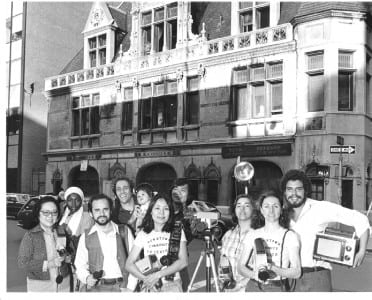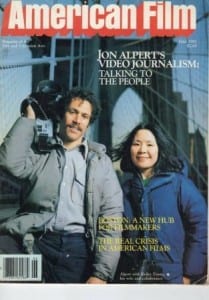The Early Days of Video: A Conversation with Jon Alpert & Keiko Tsuno
by The Gotham Staff on October 3, 2012 in Distribution
DCTV Co-Founders Jon Alpert and Keiko Tsuno discuss their beginnings in filmmaking during the early days of video and what drove them to start DCTV in 1972.
Keiko: I came to this country to study fine arts and my main interest was video, so I bought Sony’s first black and white camera. It was very expensive back then. It cost $1600.
Jon: Rent was $65 a month. So it cost the equivalent of two years’ rent.
K: I was living in a loft building on Canal Street. I wanted it to be a kind of Zen retreat. Everything was painted white, with little more than a picnic table for furniture. I wanted to make my life very simple–to put all my energy into my artwork. Then Jon came into my life.
From the beginning, Jon wanted to use video to effect change. He thought that artists were self-centered. He would say, “I want to do something to help society.” Jon was organizing for a taxi drivers’ union. He asked if I wanted to videotape their strike. I agreed, but the equipment was very heavy and I needed someone to carry the deck while I worked the camera. So Jon and I went to the Bronx and videotaped the strike.
Later, we invited the drivers to a screening in Manhattan. About 50 showed up. The reaction was instant. It inspired debate and action. At the time people still didn’t know what video was. It was very new to see ordinary people’s stories being told in such a manner, with such immediacy.
J: The early creative ideas came from Keiko, but I was more reactive. When I saw the catalytic power that video had, I thought it would be a useful tool to accomplish the goals we were trying to reach. We were trying to improve healthcare and schools in lower Manhattan, to improve the quality of life of the city’s taxi drivers, to end the Vietnam War. We weren’t having much success. But once we began using video, our efforts started working.
The equipment in those days was so new and primitive. There was a real pioneer feeling to it.
K: Tape spooled out of the machine haphazardly. Editing the tape required cutting it with razors.
J: When the first editing machine came out, ours would always catch on fire. A fire extinguisher was a key part of our editing station. We were inventing our own equipment. Other people were also. It was a time of experimentation. Someone invented a method for getting a second audio track by using a piece of paper over the audio erase head. I made a directional mic by wrapping cardboard–the kind that comes with shirts from the cleaners–around a cheap mic. It didn’t work very well.
K: There was a lot of bonding between video artists at that time. Everything was so new and everyone was so hungry. Video had a kind of magic power. Knowing that we were involved in video bonded us together.
J: There were around a dozen video collectives in lower Manhattan. We were all pushing the envelope, learning from each other, going to watch each other’s tapes. There was a spirit of collectivism at the time.
In those days it was hard to reach an audience. Broadcast TV thought we were all crazy. We decided to make TV by the people, for the people, and bring it to the people. Using an old mail truck and televisions, we set up a mobile screening unit. It was a harsh and unforgiving environment for exhibiting our videos. There was poor lighting. We were usually parked on Canal Street, so it was noisy. All of this yielded an audience with a pretty short attention span.
Sometimes we thought we had made something great, only to realize it didn’t resonate with the public. It pushed us to try to tell a story in a concise fashion, in a way that connected with the audience. It was a great learning experience that kept us humble.
When we saw how effective video could be, and real change coming from our tapes, we felt it was our duty to do this work. But there was only so much we could do ourselves. We started DCTV to deputize others to join our cause. If people wanted to learn how to use equipment, we taught them. We let people use our cameras. All for free.
K: Over at Paper Tiger TV, there’s a quote attributed to me, although I don’t remember if I said it: “Give everyone a camera and change the world.” That was the ethos of what we were striving to do.
Support and celebrate 40 years of filmmaking at DCTV’s 40th Anniversary Celebration on October 11th! http://www.dctvny.org/40th


